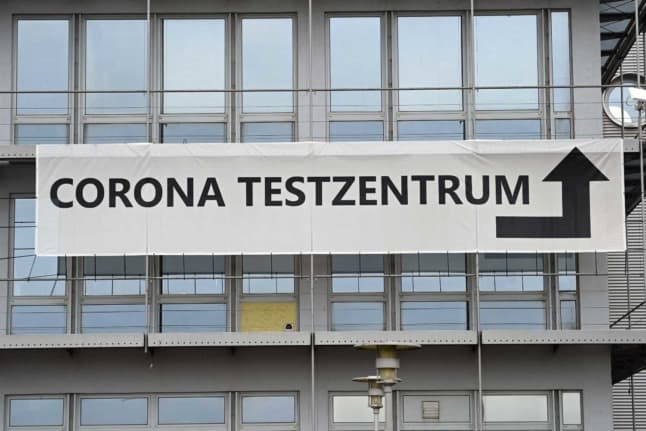UPDATE: First Omicron cases detected in Zurich and Bern

The first cases of the new Omicron variant have been detected in Zurich and Bern, bringing the total number of cases in Switzerland to five.
Both cases were confirmed on Thursday.
In Zurich, the infected person and four contacts in quarantine.
The person travelled to Switzerland from South Africa on November 23rd and felt symptoms of the virus two days later before testing positive.
In Bern the person arrived from South Africa four to five days ago, reported only mild symptoms and only came into contact with one person, who is in isolation.
This is the first case to be confirmed in Zurich, Switzerland’s largest canton.
The vaccination status of the infected person has not yet been released by Swiss authorities.
Due to the concern about the Omicron variant, Swiss authorities announced that everyone who comes into contact with someone who has been infected must quarantine.
Omicron in Switzerland: Vaccinated people also have to quarantine
Swiss authorities have also tightened borders due to concern about the virus.
In Switzerland, travellers from 23 countries must present a negative test when boarding a plane and entering Switzerland, then quarantine for 10 days.
READ MORE: UPDATE: What are the current rules for entering Switzerland?
“Worrying variant”
Classified last Friday as “worrying” by WHO, Omicron, initially detected in South Africa, is spreading quickly in Europe.
The agency urged countries to conduct genomic sequencing and contact tracing of confirmed cases, and called for people to not travel to affected areas.
The classification puts Omicron into the most-troubling category of Covid-19 variants, along with the globally-dominant Delta, plus its weaker rivals Alpha, Beta and Gamma.
The Omicron strain is believed to be more transmissible and current vaccines may not provide adequate protection against it, though more data is still needed to be sure.
EXPLAINED: How will Switzerland enforce the Covid certificate in private homes?
While some experts have expressed concern that the highly transmissible variant can evade vaccines, early evidence from Israel suggests the vaccines remain 90 percent effective in stopping the spread of the variant.
This compares with a 95 percent effectiveness rate in preventing the spread of the dominant Delta strain of the virus.
Ugur Sahin, boss of Biontech who co-developed one of the most prominent vaccines for the virus, said that even if vaccinated people contract Omicron, they are unlikely to receive a severe course of the disease.
Comments
See Also
Both cases were confirmed on Thursday.
In Zurich, the infected person and four contacts in quarantine.
The person travelled to Switzerland from South Africa on November 23rd and felt symptoms of the virus two days later before testing positive.
In Bern the person arrived from South Africa four to five days ago, reported only mild symptoms and only came into contact with one person, who is in isolation.
This is the first case to be confirmed in Zurich, Switzerland’s largest canton.
The vaccination status of the infected person has not yet been released by Swiss authorities.
Due to the concern about the Omicron variant, Swiss authorities announced that everyone who comes into contact with someone who has been infected must quarantine.
Omicron in Switzerland: Vaccinated people also have to quarantine
Swiss authorities have also tightened borders due to concern about the virus.
In Switzerland, travellers from 23 countries must present a negative test when boarding a plane and entering Switzerland, then quarantine for 10 days.
READ MORE: UPDATE: What are the current rules for entering Switzerland?
“Worrying variant”
Classified last Friday as “worrying” by WHO, Omicron, initially detected in South Africa, is spreading quickly in Europe.
The agency urged countries to conduct genomic sequencing and contact tracing of confirmed cases, and called for people to not travel to affected areas.
The classification puts Omicron into the most-troubling category of Covid-19 variants, along with the globally-dominant Delta, plus its weaker rivals Alpha, Beta and Gamma.
The Omicron strain is believed to be more transmissible and current vaccines may not provide adequate protection against it, though more data is still needed to be sure.
EXPLAINED: How will Switzerland enforce the Covid certificate in private homes?
While some experts have expressed concern that the highly transmissible variant can evade vaccines, early evidence from Israel suggests the vaccines remain 90 percent effective in stopping the spread of the variant.
This compares with a 95 percent effectiveness rate in preventing the spread of the dominant Delta strain of the virus.
Ugur Sahin, boss of Biontech who co-developed one of the most prominent vaccines for the virus, said that even if vaccinated people contract Omicron, they are unlikely to receive a severe course of the disease.
Join the conversation in our comments section below. Share your own views and experience and if you have a question or suggestion for our journalists then email us at [email protected].
Please keep comments civil, constructive and on topic – and make sure to read our terms of use before getting involved.
Please log in here to leave a comment.